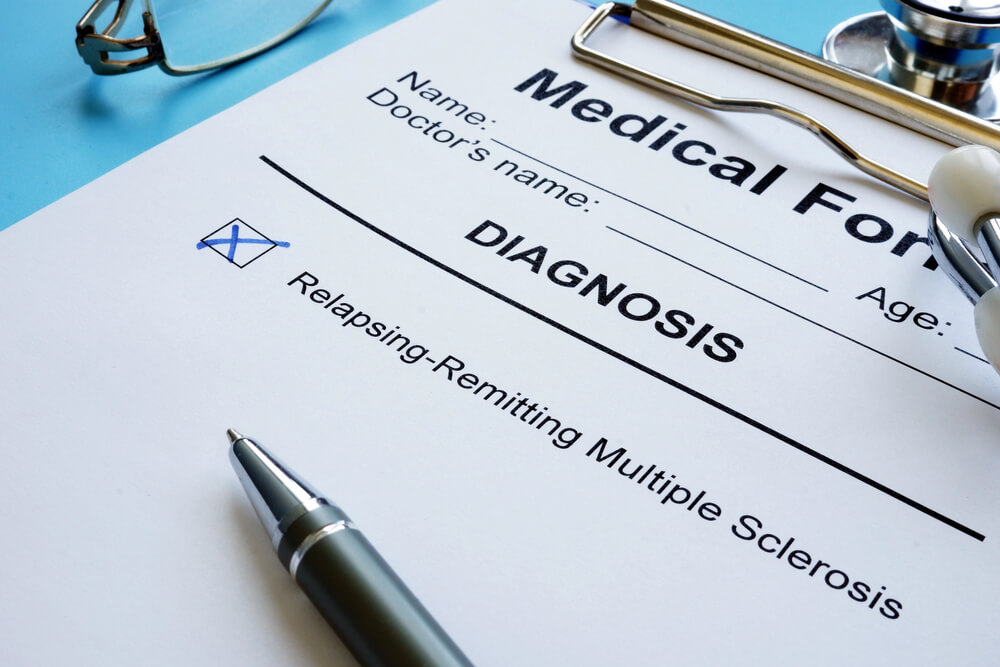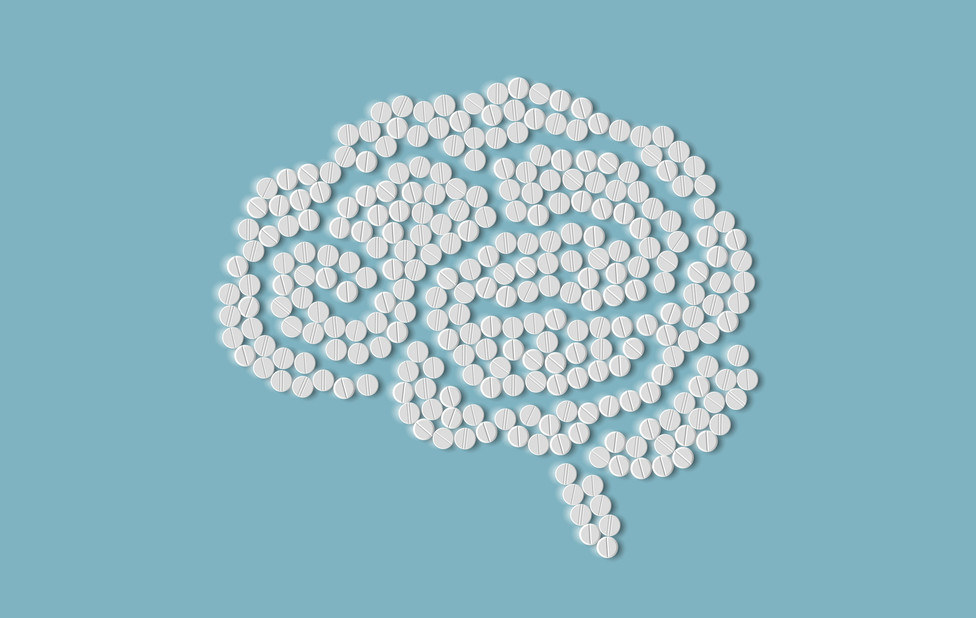Modafinil, a well-known wakefulness-promoting medication, is quickly gaining attention for its potential to combat fatigue in individuals with multiple sclerosis (MS). As MS becomes an increasingly prevalent condition, fatigue remains one of the most disabling symptoms, severely impacting daily life.
This guide explores the growing use of modafinil for multiple sclerosis, providing essential information on its benefits, proper dosage, potential side effects, and how it could make a meaningful difference in improving the quality of life for MS patients.
What Is Modafinil?
Modafinil is a prescription med originally developed in France in the 1990s and approved under the brand name Provigil by the FDA in 1998 [1]. It’s primarily used to treat conditions that cause excessive daytime sleepiness, such as narcolepsy, obstructive sleep apnea (OSA), and shift work sleep disorder (SWSD). The drug promotes wakefulness and alertness, allowing individuals to stay active during the day or at night shift despite disrupted sleep patterns.
Beyond its FDA-approved uses, modafinil is commonly prescribed off-label for managing fatigue in conditions like multiple sclerosis, attention deficit hyperactivity disorder (ADHD), Parkinson’s disease, jet lag, Alzheimer’s disease, depression, weight loss, etc. Besides, being dubbed the “world’s first safe ‘smart tab,’” it’s frequently used by healthy individuals from all walks of life, even in some military and corporate settings, to heighten their brainpower to achieve an edge & boost productivity.
The cognitive benefits of modafinil are significant. It improves attention & executive function and augments creativity. Modafinil also presents a whole new level of mental acuity. It offers insanely great energy, heightened working & episodic memory, incredible motivation, diminished fatigue, and upgraded alertness if used suitably. Undoubtedly, the modafinil tab helps in decision-making, planning, & fluid intelligence, among other things [2][3].
Unlike traditional stimulants, modafinil offers these benefits without causing jitteriness or crashes and isn’t associated with addiction or dependence. This makes it a preferred choice for cognitive enhancement, particularly for individuals with cognitive disorders or those needing to maintain high levels of focus for extended periods to achieve an edge.
What Is Multiple Sclerosis (MS)?
Multiple sclerosis is a chronic autoimmune disease that affects the central nervous system (CNS), including the brain and spinal cord. It occurs when the immune system mistakenly attacks myelin, the protective sheath around nerve fibers, leading to inflammation and disrupted nerve signaling. This damage causes a wide range of symptoms that vary in severity and progression.
Common symptoms of MS include debilitating fatigue, vision problems (such as blurred or double vision), numbness or weakness (often in one side of the body), and balance issues like dizziness or instability. Patients may also experience muscle stiffness, spasms, pain, tremors, cognitive impairments, and bladder or bowel issues [4]. Symptoms can flare up suddenly (relapses) or progress gradually, making the condition highly unpredictable.
While the exact cause of MS remains unclear, factors such as genetic predisposition, environmental triggers, and potential viral infections are believed to contribute. Most cases are diagnosed between ages 20 and 40, with women being more likely to be affected.
Basic Information About Treatment Methods
While there is no cure for multiple sclerosis, advancements in medical science have provided effective treatment options tailored to the needs of individuals with the condition.
Treating MS involves a combination of strategies to reduce symptom severity, slow disease progression, and enhance quality of life. The foundation of multiple sclerosis management lies in disease-modifying therapies (DMTs), which help reduce the frequency and intensity of relapses while potentially delaying disability progression. Injectable meds like interferon beta and glatiramer acetate are among the first-line options, while oral treatments such as fingolimod and dimethyl fumarate provide convenience for individuals with relapsing MS.
For more aggressive forms of the disease, infused treatments like ocrelizumab and natalizumab are often prescribed. These therapies are chosen based on a patient’s disease activity, health profile, and lifestyle, but they may come with potential side effects that require careful monitoring and consultation with healthcare providers.
In addition to DMTs, addressing the diverse symptoms of MS is crucial for improving day-to-day functioning. Fatigue, one of the most debilitating symptoms, can be managed with meds like modafinil or energy conservation techniques. Muscle stiffness and spasms, or spasticity, are alleviated using muscle relaxants such as baclofen or tizanidine, while neuropathic pain may respond to drugs like gabapentin or pregabalin.
For bladder and bowel dysfunction, therapies such as anticholinergic medications and pelvic floor exercises are commonly utilized. Rehabilitation services, including physical therapy, occupational therapy, and speech therapy, play an integral role in maintaining mobility, improving independence, and addressing speech or swallowing difficulties. Cognitive training also supports individuals experiencing memory, focus, or problem-solving challenges.
Lifestyle adjustments further complement medical treatments, offering a holistic approach to MS management. Anti-inflammatory diets rich in fruits, vegetables, and omega-3 fatty acids support overall health, while low-impact exercises such as swimming, yoga, or walking can improve strength and reduce fatigue. Stress management techniques, including mindfulness, meditation, and counseling, are effective in mitigating symptom flare-ups linked to emotional strain. Emerging therapies like stem cell treatments and neuroprotective agents also hold promise for future MS management, although these are still under research [5].
Using Modafinil to Reduce Fatigue in MS
If you experience persistent fatigue associated with MS, it’s crucial to consult a physician before considering modafinil. Fatigue in MS can have various underlying causes, and only a doctor can determine whether this medication is suitable for your specific condition. They will assess your overall health, review your medical history, and possibly perform tests or evaluations to rule out other contributing factors.
Your doctor will evaluate whether modafinil is the right choice based on the severity of your fatigue and its impact on your daily life. They may also consider other treatments or lifestyle changes that could help manage your symptoms. Open communication about your symptoms is essential during this process, as it helps the doctor develop a comprehensive treatment plan tailored to your needs. Self-medicating with modafinil is strongly discouraged, as improper use can lead to unwanted negative effects or interactions with other meds.
Correct Dosage
The standard recommended dose of modafinil for managing MS fatigue is 200 mg per day. This dosage is effective for most individuals, though it can be adjusted based on tolerability and individual response. If side effects occur, a doctor may recommend lowering the dose to 100 mg per day. For those who don’t experience sufficient relief, the dosage can be increased, but it should never exceed the maximum of 400 mg per day, which should only be prescribed under strict medical supervision.
It’s important to take modafinil with water and, ideally, on an empty stomach or after a light meal for optimal absorption. Never exceed the prescribed dosage, as overdosing can lead to serious side effects. Never self-medicate or adjust the dosage without consulting your physician.
Also, avoid alcohol while using modafinil, as it can increase the risk of adverse effects or reduce the medication’s effectiveness. Furthermore, caution is needed when combining modafinil with other meds. Always discuss any existing treatments with your doctor to avoid harmful interactions, especially with drugs that affect the central nervous system or stimulate the brain. Consistent follow-up with your healthcare provider ensures that modafinil remains both safe and effective for managing MS-related fatigue.
Proven Benefits
The “smart tab” can significantly reduce fatigue in individuals with multiple sclerosis. In a study of 50 MS patients, those who took modafinil demonstrated a clear improvement in fatigue, with 87.2% of participants reporting substantial relief [6]. On the Fatigue Severity Scale (FSS), scores dropped from 30.3 to 25.4 over three months, indicating significant fatigue reduction. Similarly, the Epworth Sleepiness Scale (ESS), which measures daytime sleepiness, showed a marked improvement from 9.7 to 4.9.
A separate study, evaluating modafinil for up to 12 weeks, found that 200 mg daily effectively alleviated fatigue symptoms. However, increasing the dose to 400 mg daily did not maintain these benefits, with some participants experiencing side effects. This evidence suggests that modafinil works best at lower doses for MS-related fatigue [7].
Additionally, a study involving cognitive behavioral therapy (CBT) and modafinil revealed that both treatments could effectively reduce fatigue, but the choice of treatment may depend on the patient’s sleep habits. Those with better sleep habits responded better to modafinil, while those with poorer sleep habits saw greater benefits from CBT [8].
Further, another study reviews the efficacy and safety of modafinil for treating fatigue in MS patients. The results showed the treatment was well-tolerated and that 200 mg/day modafinil significantly improved fatigue scores on the FSS and MFIS compared to the placebo. Nonetheless, the related 400 mg/day dose didn’t offer additional benefits [9].
Ultimately, many MS patients experience brain fog, including difficulties with concentration, memory, and mental clarity. However, modafinil can help alleviate brain fog in MS by reducing fatigue and promoting wakefulness, indirectly improving concentration, mental clarity, and overall cognitive function.
Side Effects and Precautions
Modafinil is generally considered safe and well-tolerated for managing multiple sclerosis fatigue, but side effects can occur. These are categorized as mild or severe. Common mild side effects include headache, insomnia, gastrointestinal problems, dry mouth, nausea, diarrhea, and dizziness. These mild reactions often fade as the body adjusts to the medication. Severe side effects, though rare, may involve a fast heartbeat, suicidal thoughts, hallucinations, depression, tremors, or hyperactivity. In some cases, severe allergic reactions like rashes or blisters might develop, necessitating immediate medical attention. This isn’t a thorough list. Other side effects can occur [10].
Before using modafinil to address MS-related fatigue, certain precautions and warnings must be considered. If you have pre-existing conditions such as heart problems, high blood pressure, liver or kidney disease, or mental health issues, you should avoid the medication unless explicitly cleared by a physician. Pregnant women are advised against using modafinil due to potential risks to the fetus. Additionally, combining modafinil with alcohol can heighten the likelihood of adverse effects. While the drug generally doesn’t interact with most foods, taking it alongside fatty meals may delay its effects.
Modafinil has known interactions with various meds. For example, it may interact with antifungals, certain antibiotics, monoamine oxidase inhibitors (MAOIs), blood thinners, and CYP2C19 and CYP3A4/5 substrates. It also reduces the effectiveness of hormonal birth control methods, increasing the risk of unintended pregnancies. Patients should always inform their healthcare provider about all medications, supplements, or health products they are using before starting modafinil to ensure there are no harmful interactions.
Though modafinil has a low potential for addiction compared to stimulants like methamphetamine or cocaine, it can still lead to dependency in rare cases. This is primarily linked to its effect on dopamine regulation in the brain. Misuse, particularly at higher doses, may increase the risk of dependence [11]. Individuals with a history of substance abuse or those prone to increasing doses to maintain the drug’s effects are at higher risk. However, when taken as prescribed and under medical supervision, the likelihood of addiction remains minimal.
The Verdict: Modafinil for Multiple Sclerosis
Modafinil is a valuable option for addressing multiple sclerosis fatigue, providing relief from one of the most challenging symptoms of the condition. It has proven benefits in enhancing wakefulness, reducing fatigue, and improving cognitive clarity, offering the possibility of greater independence and making daily life more manageable for MS patients. While it’s not a standalone solution, the “smart tab” can play a crucial role as part of a well-rounded treatment plan that includes lifestyle adjustments, symptom management strategies, and other meds.
Its low potential for addiction and relatively mild side effect profile make it a practical choice for long-term symptom management under medical supervision. However, it’s essential to work closely with a physician to tailor the dosage and monitor any side effects. When used responsibly and as part of a comprehensive approach, modafinil can help patients regain control over their lives and improve their ability to engage in meaningful activities.
References
- Modafinil. Retrieved: December 5, 2024. Wikipedia.org.
- Practical Use and Risk of Modafinil, a Novel Waking Drug. By Dongsoo Kim. Published: February 22, 2012. Pmc.ncbi.nlm.nih.gov.
- The off-prescription use of modafinil: An online survey of perceived risks and benefits. By Rachel D. Teodorini, Nicola Rycroft, and James H. Smith-Spark. Published: February 5, 2020. Journals.plos.org.
- Multiple sclerosis. Retrieved: December 5, 2024. Mayoclinic.org.
- Chapter 6 Stem Cell Therapy: A Promising Therapeutic Approach for Multiple Sclerosis. By Fereshteh Pourabdolhossein, Hatef Ghasemi Hamidabadi, Maryam Nazm Bojnordi, and Sina Mojaverrostami. Published: November 27, 2017. Ncbi.nlm.nih.gov.
- Modafinil in treatment of fatigue in multiple sclerosis. Results of an open-label study. By Udo A. Zifko, Monika Rupp, Sigrid Schwarz, Harald T. Zipko, and Eva M. Maida. Published: August 2002. Pubmed.ncbi.nlm.nih.gov.
- Modafinil for the treatment of multiple sclerosis-related fatigue. By Jamie N. Brown, Caroline A. Howard, and Debra W. Kemp. Published: May 4, 2010. Pubmed.ncbi.nlm.nih.gov.
- Findings back therapies to abate multiple sclerosis fatigue. By Brian Donohue. Published: October 16, 2024. Newsroom.uw.edu.
- Efficacy and safety of modafinil (Provigil®) for the treatment of fatigue in multiple sclerosis: a two centre phase 2 study. By K. W. Rammohan, J. H. Rosenberg, D. J. Lynn, A. M. Blumenfeld, C. P. Pollak, and H. N. Nagaraja. Published: April 13, 2016. Jnnp.bmj.com.
- Modafinil (Provigil) – Uses, Side Effects, and More. By Beth Johnston. Medically reviewed by Dana Manning. Retrieved: December 5, 2024. Webmd.com.
- A rare case modafinil dependence. By Raman Krishnan and Krishnan Vengadaragava Chary. Published: January 2015. Pmc.ncbi.nlm.nih.gov.









